By Brian A. Stenzler, M.Sc, D.C.
Watch the Video
Listen to the Audio
In last week’s Wellness Wiki, The Truth About Corn Syrup, I promised that I would dedicate my next several posts on the food related “deal breakers” mentioned in my book, DREAM Wellness: The 5 Keys to Raising Kids for a Lifetime of Physical and Mental Health. These are the ingredients that my family and I avoid as much as humanly possible. In no specific order, they are corn syrup (as discussed last week), artificial sweeteners, hydrogenated oils and artificial food coloring (food dyes).
While these are not the only ingredients you should consider avoiding, if you want your body to look, feel and function the way you desire, then there is no place for these items in your or your family’s diet, PERIOD.
What are Artificial Sweeteners?
Artificial sweeteners are additives designed to make food and beverages taste sweet without using sugar, and they contain few to zero calories. Sounds too good to be true, doesn’t it? Well, the FDA says they’re safe, so they must be. Well, maybe not. Maybe we should not blindly trust politicians and bureaucrats with special interests to tell us what is good for us and start to follow the science on our own and speak with our trusted healthcare providers and nutritionist.
Let’s start with the redeeming qualities of these non-caloric artificial sweeteners, which should take fewer than 10 seconds to read. We know that sugar in general, especially in large quantities is not good for you. If you have a sweet tooth and do not want the extra calories or blood sugar fluctuations, an alternative would be in order. Artificial sweeteners are an alternative to sugar. Okay done with the good stuff.
Artificial sweeteners are not a healthy alternative to sugar. In fact, I would argue that if I needed to choose between sugar itself or an artificial sweetener, I would choose the sugar in a heartbeat. Even refined sugar, which I avoid as much as possible, would be chosen over the artificial sweeteners. In the case of diabetes, consult your healthcare provider about your options as sugar is not advised, but I never recommend artificial sugars either.
So Why Are Artificial Sweeteners So Bad?
Well, if you read most of the literature on them, you would think I was crazy and they are the best thing since sliced bread . . . which they are if you think bread is good for you! Okay, I digress . . . let’s get into the science . . .
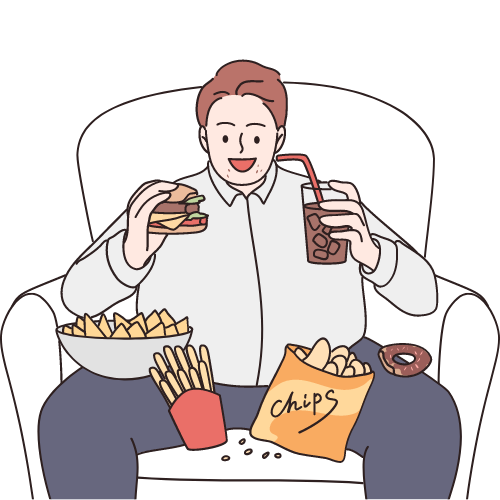
First off, because artificial sweeteners have no nutrients in them (or calories), they can cause you to eat and drink more of the food or beverage that is being sweetened. While calories are partially responsible for weight gain, they also give energy and allow us to satiate ourselves, which means, we get “full” when we consume them. Food and beverages without calories can cause us to consume much more than we normally would which could easily lead to weight gain and metabolic syndrome. (High fructose corn syrup, as discussed last week, does the same.)
Additionally, when you consume something sweet, the brain thinks you are consuming sugar, which in turn causes the pancreas to produce insulin to breakdown the sugar. However, when there is no actual sugar to breakdown, the pancreas gets confused and works in overdrive. These are not technical terms; I’m simplifying the process so that you understand what is happening. What do you think happens if the pancreas is working, producing, and releasing insulin into the bloodstream when it doesn’t need to?
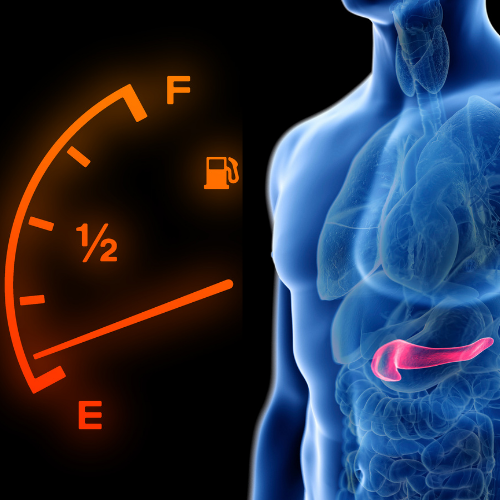
This is like having your car engine on, the car in neutral and you are stepping really hard on the gas pedal for an extended period of time. Do you think that is good for your car? When your pancreas is working when it does not need to, it begins to stop working . . . just like your car would eventually run out of gas. What happens when your pancreas stops working? That’s right, type II diabetes results.
Sucralose (known as Splenda), for example, is 600 times sweeter than sugar. Think about how much work the pancreas will think it needs to do when the brain thinks it needs to breakdown that much sugar.
The most common artificial sweeteners we see today are aspartame (Equal and NutraSweet), sucralose (Splenda), acesulfame potassium (Sunnet and Sweet One), and saccharin (Sweet ’n Low). Aside from the effects these artificial sweeteners can have related to insulin production, there is also widespread concern that some of them may be carcinogenic. There is much more research that needs to be done, and it must be done by independent parties not related to the companies that manufacture them.
Combined, the potential side effects can include headaches, migraines, dizziness, cancers, digestive problems with “leaky gut,” mood swings and more. Additionally, consuming artificial sweeteners during pregnancy and breastfeeding can potentially cause harm to the unborn or nursing child. Research has provided evidence that exposure to these sweeteners can predispose the fetus/baby to metabolic syndrome and obesity later in life1.
The most unfortunate aspect to artificial sweeteners, aside from the negative health effects, is that they are found in so many diet foods and drinks, as well as alleged “health food” products, such as protein powders, children’s chewable vitamins and even toothpaste.
Acceptable Sugar Substitutes
Sugar alcohols, including xylitol, sorbitol, maltitol, mannitol and erythritol are sugar substitutes, are not synthetic and they do not seem to negatively affect blood glucose levels. Some even have demonstrated positive health benefits, including helping prevent tooth decay. However, some can cause minor issues and symptoms, including belly aches. Because the body cannot digest most sugar alcohols, they end up being metabolized by the gut bacteria in the large intestine. I would recommend only using sugar alcohols in limited amounts, as there is still much we do not know about them, and there could be potential health issues down the road. Personally, I don’t feel great when I consume them, so I avoid them most of the time.
A Sweet Life…
Now that we know that both sugar and artificial sweeteners are not wonderful, how do you get around them and still enjoy life?
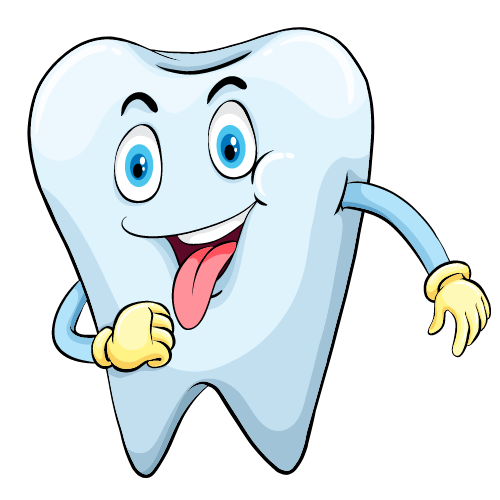
I would say that the first step is to find a way to enjoy life (and food) without the need for something sweet, too often. There are plenty of natural spices, herbs and flavors that wet the palate and make our foods tasty and enjoyable. To “need” something sweet is a sign that something else is lacking. I can tell you with certainty that no one was born with a tooth that requires sweetness, or a “sweet tooth.” If you have a well-balanced diet, your hormones are in check and you are living a wellness lifestyle, your cravings should be minimal if at all, and they usually will pass within a short period of time. Additionally, palates do change over time, so the less sweetness you consume, the less you will need.
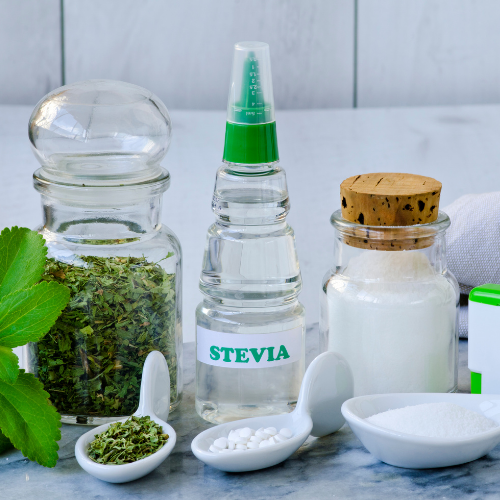
If you must go for something sweet, here are some options on the healthier side. I personally like stevia, organic of course. Some people do not like the taste of it and others claim to have a sensitivity as well, but it is certainly worth trying. As of the latest research that I have evaluated, there is no real downside to stevia in moderation. It is a naturally occurring herb (plant) and can be purchased as an extract. While the potential is there to have a similar impact on the pancreas as other non-caloric sweeteners mentioned, this natural sweetener is not nearly as sweet as those, so it would take a ton of stevia to have a similar effect. Stevia is the sugar substitute found in the protein powders that I drink. Another similar option to stevia without any score on the glycemic index because it has no sugar is monk fruit. Other natural sweeteners may include organic raw local honey, dates and even apples. Those do have sugar, but because they are not processed sugars and have a lower glycemic index, they are better choices than table sugar.
I am well aware that people enjoy a sweet treat here and there, but we must be mindful of what we put into our bodies and feed our children, all of the time. In fact, one thing worse than you consuming artificial sweeteners is giving it to your children. As children grow, their cells are replicating incredibly fast. It is advisable to keep your children’s diet as free from synthetic additives as much as possible. With a little bit of knowledge and discipline, we can choose to be empowered by our decisions rather than feel deprived. It is the seemingly little choices that we make daily that will determine your family’s health today, and into the future.
[i] João Ricardo Araújo, Fátima Martel, and Elisa Keating, “Exposure to non-nutritive sweeteners during pregnancy and lactation: Impact in programming of metabolic diseases in the progeny later in life,” Reproductive Toxicology 49 (November 2014): 196–201, https://www.sciencedirect.com/science/article/abs/pii/S0890623814002445?via%3Dihub

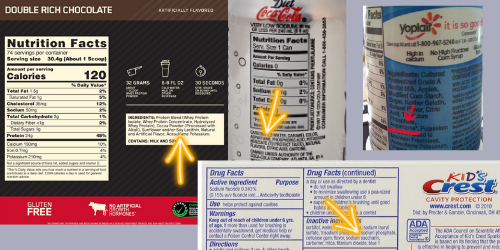
2 Comments